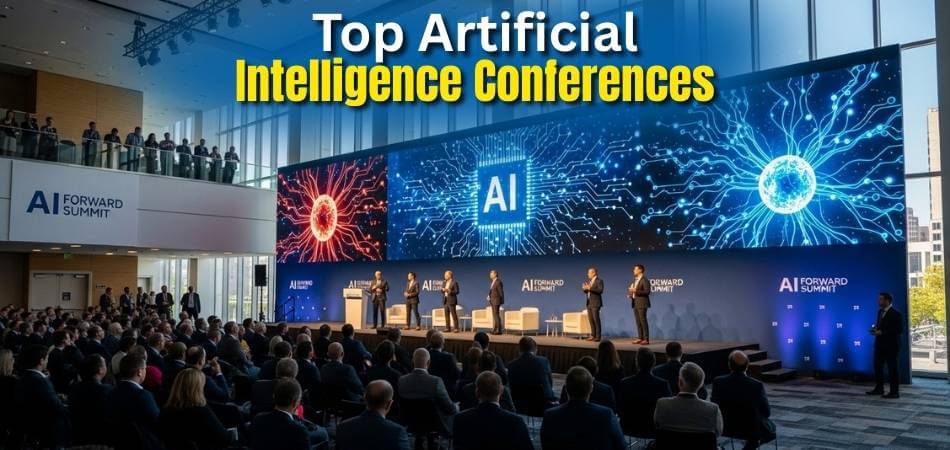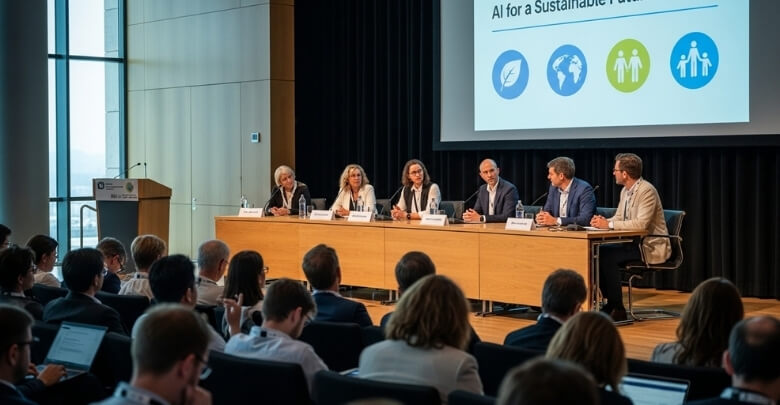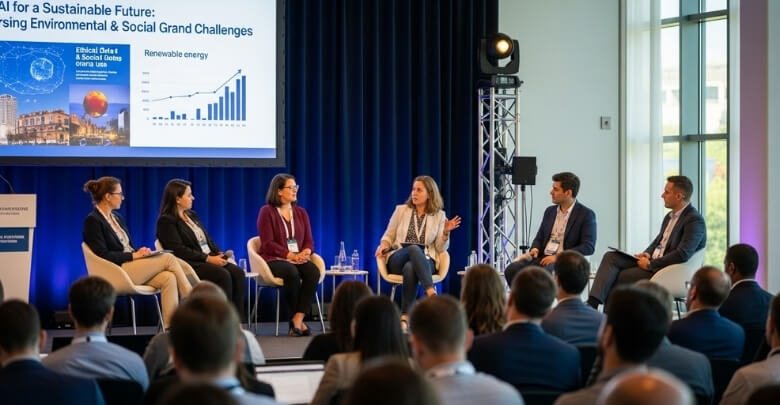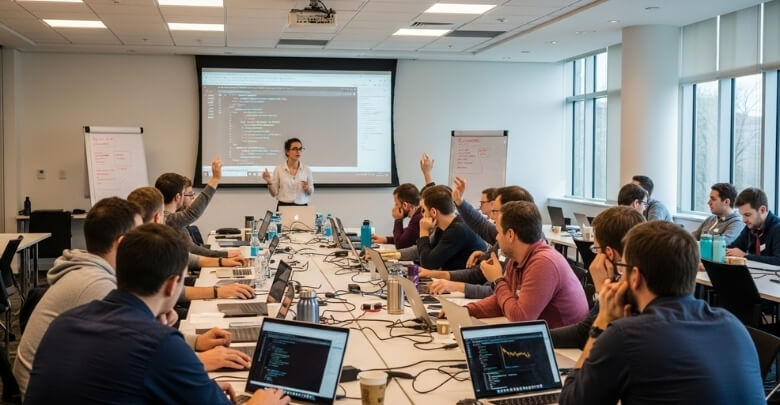Cybersecurity has become a major part of our digital world, as every step online carries risks that need protection. With experts working hard to build safer systems, people often look for the best places to learn about new updates, and many think about the top cybersecurity conferences.
Attending AI events boosts learning, impact, and global innovation. Key events include the 33rd Global Conference on Machine Learning and Artificial Intelligence, The AI Summit New York, and the Annual AAAI Conference on Artificial Intelligence. These conferences help shape the future of smart technologies.
Readers interested in the subject are likely curious about what these events cover and why they are so important. This article brings together everything you need to know, offering details about upcoming events, topics of focus, and the value they provide for professionals and learners alike.
Top Artificial Intelligence Conferences
Bringing experts together has always been one of the simplest ways to introduce new ideas and guide the future of technology. These events highlight research, industry solutions, and real progress. Here are some of the top conferences you should know about.
- 33rd Global Conference on Machine Learning and Artificial Intelligence | November 8, 2025 – Toronto, Canada
- The AI Summit New York | December 10–11, 2025 – Javits Center, New York, USA
- Annual AAAI Conference on Artificial Intelligence | January 20–27, 2026 – Singapore
- AI & Big Data Expo Global | February 4–5, 2026 – London, Great Britain
- HumanX 2026 | April 6–9, 2026 – San Francisco, CA, USA
- DSC Next 2026 | May 7–8, 2026 – Amsterdam, the Netherlands
- IEEE Conference on Artificial Intelligence | May 8–10, 2026 – Granada, Spain
- AI for Good Global Summit 2026 | July 7–10, 2026 – Geneva, Switzerland
- International Joint Conference on AI and European Conference on AI | August 8–14, 2026 – Bremen, Germany
- Ai4 2026 | August 4–6, 2026 – Las Vegas, CA, USA
1. 33rd Global Conference on Machine Learning and Artificial Intelligence (GCMLAI)
People from across the globe will gather to discuss new ideas in learning systems and intelligent machines. This event is planned for November 8, 2025, in Toronto, Canada. Among the upcoming international conferences, this one is considered important because it brings together researchers, innovators, and industry professionals to exchange valuable knowledge and highlight how advanced systems can solve real-world challenges effectively.
2. The AI Summit New York
This event will highlight how companies are using technology to create practical business solutions. Scheduled for December 10–11, 2025, at the Javits Center in New York, USA, it will include workshops, live demonstrations, and enterprise-level discussions. Attendees will get to learn about commercial applications and strategies while interacting with industry leaders who share real-world experiences.
3. Annual AAAI Conference on Artificial Intelligence
Scholars and practitioners value the conference for its strong research focus and meaningful academic discussions. Happening January 20–27, 2026, in Singapore, it offers a platform to present peer-reviewed studies and explore advanced topics in computer science. The program spans reasoning systems, planning, and interactive AI models.
4. AI & Big Data Expo Global
This well-rounded event is designed for professionals seeking practical and business-focused learning. Taking place on February 4–5, 2026, in London, Great Britain, it includes a mix of enterprise sessions, networking, and discussions on applied technology. Topics like generative models, natural language tools, and ethical practices will be central, along with deep learning and secure data management ecosystems.
5. HumanX 2026
Industry leaders will gather here to focus on the real-world adoption of technology within enterprises. The conference will run from April 6–9, 2026, in San Francisco, CA, USA. Its sessions are designed mainly for executives, business leaders, and investors. The discussions revolve around actionable strategies, enterprise-scale systems, and agent-based intelligence, helping attendees make informed decisions on applying these solutions effectively.
6. DSC Next 2026
This event is built for professionals who aim to put advanced methods into everyday business practices. Scheduled for May 7–8, 2026, in Amsterdam, the Netherlands, it welcomes leaders, scientists, and experts. The agenda covers applied data science, large-scale systems, MLOps, and industry case studies in finance, healthcare, and cybersecurity. It blends technical knowledge with real industry applications for stronger outcomes.
7. IEEE Conference on Artificial Intelligence
Many in the research community see this conference as a go-to place for serious academic exchange. It is set for May 8–10, 2026, in Granada, Spain, and attracts researchers, professionals, and students. Presentations will dive into fields like robotics, healthcare, computer vision, and business intelligence. Ethics and security in intelligent systems are also emphasized, ensuring balanced discussions between research depth and responsible usage.
8. AI for Good Global Summit 2026
Global leaders, researchers, and humanitarian experts come together at this inspiring event. Scheduled for July 7–10, 2026, in Geneva, Switzerland, it highlights how technology can solve pressing global challenges. Topics include climate protection, education, disaster response, and fair technology usage. Attendees will learn how these systems are being used responsibly to build sustainable and fair solutions for society.
9. International Joint Conference on AI and European Conference on AI
Bringing together two major gatherings, this combined event creates a hub for global and regional research. It will take place from August 8–14, 2026, in Bremen, Germany. Attendees will see the latest in natural language processing, robotics, and research ethics. The program is ideal for academics and students looking to share peer-reviewed work and learn about trends in European research.
10. Ai4 2026
This well-attended event creates a space for startups, enterprises, and practitioners. Planned for August 4–6, 2026, in Las Vegas, CA, USA, it emphasizes practical strategies, networking, and live demonstrations. Focus areas include generative systems, computer vision, and new policy approaches. It also highlights industry-specific applications in areas like finance, healthcare, retail, and government, offering both insight and hands-on learning opportunities.
In summary, these events provide a clear view of where intelligent technology is heading, while also giving experts and professionals opportunities to connect and share ideas. If you want to understand both research and real-world impact, these conferences are worth following.
How Do Artificial Intelligence Conferences Connect Academia and Industry?
Artificial Intelligence conferences bring together people from different backgrounds, but they all share the same interest in new ideas. These events create a space where learning, discussion, and collaboration can grow. Let’s look at how this connection happens.
Idea Exchange
Universities and research institutes often present fresh studies and experiments at these conferences. Tech companies attend to see what’s new and useful for real-world applications. This exchange lets both sides share their knowledge, which builds stronger connections and practical progress in the field.
Joint Projects
Conferences open doors for joint research projects between academics and companies. A university may test theories while a company provides tools or data. This teamwork helps both parties, as it turns theories into useful products and gives companies access to research talent.
Career Opportunities
Students and researchers attending these events often meet hiring teams from well-known companies. Many firms look for skilled people during these gatherings. It becomes a place where researchers can show their skills and companies can find future employees with the right knowledge.
Knowledge Sharing
Workshops and panel discussions at conferences allow experts from both sides to share lessons they have learned. Academics share theories and experiments, while companies explain real challenges from the market. This two-way sharing makes sure ideas are both creative and practical.
Networking Space
Conferences also serve as meeting points where people can build professional contacts. Researchers can meet company leaders, and companies can meet future partners. These connections often lead to lasting collaborations that continue long after the event ends.
Artificial Intelligence conferences create a bridge between classrooms and boardrooms. By sharing ideas, building projects, and making connections, they help turn research into real-world solutions that benefit both academics and industries.
What Are the Environmental and Social Topics Discussed at Artificial Intelligence Conferences?
Artificial intelligence conferences are not just about coding or research. They also focus on how these systems affect people and the planet. Experts talk about both the benefits and the problems of these technologies. These events give space for ideas that help shape the future.
Energy Use
The power needed to train and run AI systems is huge. Many models require thousands of processors that keep working for weeks. This creates a high energy demand, often compared to that of small towns. Experts discuss energy waste and share ideas on making systems more efficient.
Green Sustainability
A growing concern is how AI impacts the environment around us. Speakers share ways to cut down the carbon footprint of models. Using renewable power sources like wind and solar is one focus. They also explore designs that make technology cleaner and more eco-friendly.
Social Inequality
AI sometimes makes existing gaps in society even worse for people. Systems that are biased may block fair chances in jobs or housing. Many talks bring up fairness and human rights in technology. The goal is to create tools that are equal for everyone.
Jobs Impact
The topic of work always comes up when experts share concerns. AI can replace certain roles, which may cause job loss. At the same time, it can create new types of opportunities. Talks highlight the need for retraining people so everyone can adapt.
Privacy Issues
Conversations also cover how personal data is handled in AI systems. These tools often need massive amounts of data that includes private information of people. Without strong rules, there are serious risks of misuse or leaks. Experts stress the importance of trust, safety, and strong protections.
AI conferences explore how energy use connects with our changing environment. They also talk about social fairness and the role of future jobs. Privacy and safety remain important topics that always come into discussion. These talks help shape better systems that work fairly for everyone.
What Kind of Hands-on Learning Happens at Artificial Intelligence Conferences?
When people hear about artificial intelligence conferences, they often think of talks and presentations. But these events also include hands-on learning where participants get to practice and test their skills in real time.
- Coding Bootcamps: These sessions give step-by-step guidance on building small programs, often starting from the basics and moving toward more complex coding challenges during the event.
- Live Demos: Experts show how tools and models work in practice, letting participants watch real projects unfold and ask questions to better understand the process.
- Hackathons: Groups form teams to solve problems or create new tools within a limited time, making learning fun, challenging, and very interactive.
- Workshops: Trainers lead focused activities where participants can build, test, and fix projects, giving them direct experience instead of just listening.
- Interactive Panels: Instead of only listening to experts, participants can join discussions, try out tools on the spot, and even share their own quick solutions.
- Showcase Sessions: People present their projects and receive instant feedback, which helps them improve their work while also learning from others’ creative approaches.
- Problem-Solving Challenges: Real-world issues are shared with participants, and they work on practical solutions, learning how to apply their skills to everyday problems.
Hands-on activities like these make conferences more than just a place for listening. They turn them into spaces where learning, practice, and teamwork go hand in hand, creating a more exciting and useful experience.
How Do Artificial Intelligence Conferences Influence Future Technology Trends?
Artificial intelligence conferences bring together experts, researchers, and companies who share new ideas and discoveries. These gatherings often spark exciting discussions, inspire fresh solutions, and highlight where technology is heading next. Let’s take a closer look at how they shape future tools and trends.
Sharing New Discoveries
Researchers present their latest findings at these conferences, which often introduce new concepts before they reach the public. These ideas sometimes turn into real-world tools or systems. By sharing discoveries early, conferences give companies a chance to explore and apply them in useful ways.
Building Useful Tools
Many apps and software start as research projects discussed at these events. Developers learn about new methods and then build them into easy-to-use products. What begins as complex experiments at conferences often becomes everyday tools people use in work and daily life.
Inspiring Business Solutions
Businesses attend these conferences to find ways to improve their services. They see how new research can help solve problems like customer support, data analysis, or security. By turning these ideas into practical solutions, companies create stronger and smarter ways to serve people.
Encouraging Collaboration
Conferences are not only about speeches and papers but also about people connecting. When experts from different fields meet, they combine knowledge to create something new. These collaborations often lead to fresh inventions that might not happen if they worked alone.
Shaping Future Trends
The ideas shared at these events help predict where technology is going. What may seem like just research today can become the main trend tomorrow. By setting the stage for innovation, conferences play a big role in deciding how future technology will look.
Artificial intelligence conferences are more than just meetings. They are places where research turns into tools, where businesses find solutions, and where future technology directions are shaped.
Are Artificial Intelligence Conferences Essential for Small Businesses?
Artificial intelligence conferences bring together people from different industries to share ideas and resources. These events are not limited to large companies; smaller businesses also gain useful knowledge and connections. Let’s explore how these gatherings can benefit small businesses in many ways.
Access to Resources
Small businesses often face limits in money and tools. Conferences give them a chance to learn about affordable options, free resources, and new technologies. By listening to experts and exploring stalls, they discover practical ways to use technology without heavy spending.
Meeting New Partners
These events are filled with entrepreneurs, researchers, and service providers. Small businesses can connect with possible partners who can support their growth. By forming these partnerships, they get access to knowledge, products, and ideas that help them stay competitive.
Learning Practical Solutions
Instead of just hearing theories, conferences often show working examples. This helps smaller companies understand how to apply solutions to their own needs. Seeing real cases makes it easier for them to adopt technology in customer service, marketing, or daily operations.
Building Confidence
For many small companies, entering the world of advanced technology can feel overwhelming. Attending a conference allows them to ask questions and receive clear guidance. This support helps them gain confidence in making decisions about adopting new tools.
Staying Ahead
Technology changes fast, and small businesses cannot afford to be left behind. Conferences keep them updated about the latest trends in simple ways. Knowing what is coming next gives them a chance to prepare and act before competitors do.
What Role Do Artificial Intelligence Conferences Play in Education and Training?
Artificial intelligence conferences are not only about research and business. They also create learning spaces for people at different skill levels. With workshops and training sessions, these events open the door for valuable education. Let’s look at how this happens.
Hands-on Workshops
Workshops at conferences let participants try things themselves. Instead of just listening, they practice with real tools and see results. This style of learning makes difficult concepts easier and gives learners a stronger understanding that they can use later.
Expert Tutorials
Tutorial sessions are designed to explain topics step by step. Experts guide learners through processes in a simple way. These tutorials cover both basic and advanced areas, giving everyone a chance to pick up useful skills and knowledge.
Student Sessions
Many conferences include special sessions for young learners. These sessions encourage new talent to take part in discussions and projects. By giving them space to share, conferences help develop future professionals who will lead technology in the coming years.
Career Guidance
Along with technical learning, conferences often include talks on career growth. Professionals share advice on how to build skills and enter the job market. This kind of guidance helps participants plan their future with more clarity and direction.
Lifelong Learning
Technology never stands still, which is why learning must continue. Conferences remind participants that education does not end in classrooms. They provide opportunities to keep improving knowledge, no matter what stage someone is in their career.
FAQs About Top Artificial Intelligence Conferences
Cybersecurity conferences are full of insights, updates, and practical lessons. They help professionals, companies, and even everyday users understand how to handle digital threats. Below are some important questions and answers to give you a clear view.
How Do Cybersecurity Conferences Help Build Global Cooperation?
Cyberattacks often cross borders, making international cooperation important. Conferences invite experts from many countries to share how they deal with threats. This allows nations to learn from each other’s successes and failures. By working together, they create stronger global defenses.
What Role Do Cybersecurity Conferences Play in Protecting Personal Data?
Conferences often focus on how to keep personal information safe. Experts explain new tools and policies to secure sensitive data like emails, bank accounts, and medical records. They also discuss data laws and how companies can follow them. This helps protect people in their daily lives.
How Do Cybersecurity Conferences Highlight New Hacking Trends?
Hackers keep changing their methods, which makes updates necessary. At conferences, security experts show recent attack techniques and how they were stopped. This information spreads quickly to those who need it. Learning about these trends helps everyone stay one step ahead of cybercriminals.
Why Are Cybersecurity Conferences Important for Cloud Security?
More businesses are moving their data to cloud systems. Conferences explain the risks of cloud storage and share ways to secure it. Experts present case studies where attacks were blocked or handled. This helps businesses trust cloud solutions while staying safe.
How Do Cybersecurity Conferences Encourage Innovation?
These events give researchers and companies a chance to present new security tools. Startups often showcase creative products that solve real-world problems. Large companies also reveal updates on advanced systems. This mix of fresh and tested ideas leads to stronger solutions.
What Is the Role of Ethical Hackers at Cybersecurity Conferences?
Ethical hackers are often invited to share their skills. They show how they break into systems, but only to fix weaknesses. Their demonstrations teach companies what to improve. This makes ethical hacking an important part of conference learning.
How Do Cybersecurity Conferences Impact Digital Banking Security?
Banking systems are a big target for cybercrime. Conferences often dedicate sessions to protecting online payments and customer accounts. Experts share safe practices, encryption methods, and fraud detection tools. These talks guide banks to improve security and win customer trust.
How Do Cybersecurity Conferences Discuss Artificial Intelligence In Security?
Artificial intelligence is becoming a big part of cybersecurity. At conferences, experts explain how AI can detect attacks faster. They also warn about risks, like hackers using AI too. These discussions help balance the benefits and dangers of new technology.
What Is the Importance of Cybersecurity Conferences for Healthcare Systems?
Healthcare uses huge amounts of sensitive data, like patient records. Conferences discuss how to secure hospitals, medical devices, and health apps. Real cases of cyberattacks in healthcare are often studied. This ensures future systems are safer and more reliable.
How Do Cybersecurity Conferences Prepare for Future Threats?
Conferences don’t just talk about today’s risks but also future ones. Experts predict new dangers that may come with advanced technology. They suggest strategies and tools to handle them before they happen. This forward-looking approach makes cybersecurity stronger in the long run.
Final Words
Artificial intelligence conferences bring together researchers, companies, and innovators to share meaningful progress. They highlight both academic work and business-driven applications, making them useful for anyone who wants to understand future technology. These events act as platforms where fresh ideas turn into practical and valuable solutions.
When people ask about top cybersecurity conferences, they are looking for similar expert gatherings in the security field. These events focus on digital safety, protection from cyberattacks, and new tools for securing data. Just like AI events, they also connect researchers, professionals, and industries to build safer technology practices worldwide.
Before attending, it helps to plan what sessions matter most to you. Take notes, join discussions, and talk to professionals during breaks. These small steps make the experience richer and more useful. Wishing you the best as you explore these conferences!









